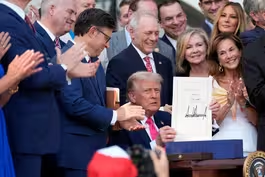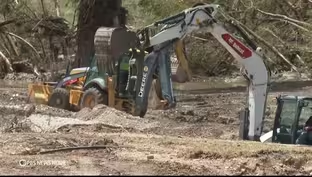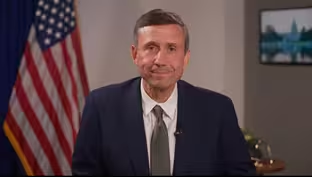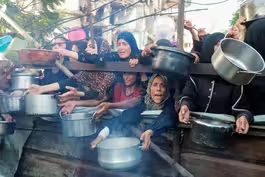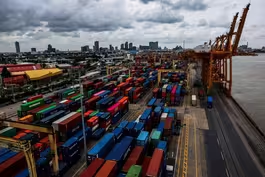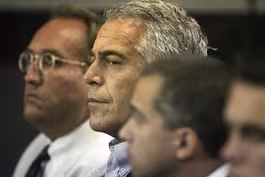
Program bridges divides by connecting people through stories
Clip: 7/9/2025 | 9m 36sVideo has Closed Captions
Program helps bridge political divides by connecting people through personal stories
As the political parties square off over numerous issues, many Americans are seeking ways to overcome division and distrust within their communities to address the issues that matter most to them. A program in Rhode Island is trying to rebuild trust across those divisions, one relationship at a time. Judy Woodruff visited for her series, America at a Crossroads.
Problems playing video? | Closed Captioning Feedback
Problems playing video? | Closed Captioning Feedback
Major corporate funding for the PBS News Hour is provided by BDO, BNSF, Consumer Cellular, American Cruise Lines, and Raymond James. Funding for the PBS NewsHour Weekend is provided by...

Program bridges divides by connecting people through stories
Clip: 7/9/2025 | 9m 36sVideo has Closed Captions
As the political parties square off over numerous issues, many Americans are seeking ways to overcome division and distrust within their communities to address the issues that matter most to them. A program in Rhode Island is trying to rebuild trust across those divisions, one relationship at a time. Judy Woodruff visited for her series, America at a Crossroads.
Problems playing video? | Closed Captioning Feedback
How to Watch PBS News Hour
PBS News Hour is available to stream on pbs.org and the free PBS App, available on iPhone, Apple TV, Android TV, Android smartphones, Amazon Fire TV, Amazon Fire Tablet, Roku, Samsung Smart TV, and Vizio.
Providing Support for PBS.org
Learn Moreabout PBS online sponsorshipAMNA NAWAZ: Even amid national discourse about a divided country, many Americans are working to bridge divides in their own communities and solve the issues that matter most to them.
Judy Woodruff recently visited Rhode Island to see how one program is trying to rebuild trust one relationship at a time.
It's part of her series America at a Crossroads.
KARL WADENSTEN, President and CEO, VIBCO: The way we're set up in this factory is very modular.
JUDY WOODRUFF: Karl Wadensten is a man on the move.
He's the president and CEO of VIBCO, a leading manufacturer of industrial equipment located in the town of Wyoming, Rhode Island, in the state's south.
KARL WADENSTEN: Many of the people we sell to are farmers that have a big farm, because we sell vibrators for the fertilizer tenders, vibrators for the grain.
JUDY WOODRUFF: It's anything that needs to be shaken in the process of manufacturing.
KARL WADENSTEN: Be shaken, yes, yes.
And I think they even had one in 007, shaken, not stirred.
JUDY WOODRUFF: In addition to running this factory, trying to stay ahead of his competition and looming tariffs, Wadensten also brings his big personality and problem-solving ethos to the state's Commerce Board, where he helps businesses grow here, even amid a shifting economic outlook.
KARL WADENSTEN: if we build all these businesses up, we don't have to worry about this tightening because we all float with a rising tide.
JUDY WOODRUFF: Meanwhile, in Providence, the state's urban core, Angie Ankoma is focused on improving public health through affordable housing, healthy food, education and work.
ANGIE ANKOMA, West Elmwood Housing Development Corporation: It's mixed income.
And so some of them are market rate.
JUDY WOODRUFF: Oh, mixed income.
ANGIE ANKOMA: Yes.
JUDY WOODRUFF: She serves on the board of the West Elmwood Housing Development Corporation, which built this 69-unit loft housing complex and next-door community spaces, including a garden to produce fresh vegetables for the residents.
ANGIE ANKOMA: Rhode Island needs to build at least close to 2,000 units annually to meet the need here.
JUDY WOODRUFF: Every year.
ANGIE ANKOMA: Yes.
JUDY WOODRUFF: Karl and Angie live in different parts of the state, work with different populations, and on the surface might not appear to have much in common.
But something they do share is the belief that, to address the real challenges before them in housing, transportation, work force development and health care, they need to find ways to connect with those who are different.
KARL WADENSTEN: Eastern culture is go to the Gemba.
Gemba means the place where things are done.
What tells me the real story is going to the bus stop, watching these poor people that are maybe waiting for the bus, going to the hospitals and seeing what's happening with the patient care, talking to the front-line workers.
No one has an agenda then.
ANGIE ANKOMA: Right now, there are people on each respective corner and there's very few people in the middle.
And there's a point where we need to be able to be in the same room and be in close proximity to one another.
MALKA KOPELL, Civity: We're going to start with some intentional introductions.
JUDY WOODRUFF: That's what the next morning is all about.
Along with more than 50 other participants drawn from a state program called Leadership Rhode Island and representing a cross section of leaders in business, government and the nonprofit sector, they meet as part of a trust-building workshop run by a national group called Civity.
MALKA KOPELL: We created this word to describe the change that we want to see, which is a culture of deliberately engaging in relationships of respect and empathy with others who are different.
JUDY WOODRUFF: Palma Strand and Malka Kopell founded the nonprofit in 2013.
WOMAN: None of us is just a single story.
JUDY WOODRUFF: Civity uses storytelling to connect people who might feel they have little in common.
WOMAN: My hidden superpower is being able to connect with people.
MAN: And I don't know if there's any substitute short of spending time with somebody.
JUDY WOODRUFF: In a peer-reviewed study, Stanford University's Polarization Lab found that their approach in the form of these videos outperformed dozens of others in helping to reduce animosity across party lines, build trust and increase support for bipartisanship.
MALKA KOPELL: I'm a public policy wonk.
I came into this work because I care about issues.
And I used to think that writing a good memo was the way to fix things.
And I started the work because I saw that that wasn't enough, that, really, these issues really did depend on how people felt about each other and who they thought was in their communities.
WOMAN: I'm the director of strategic communications at the Executive Office of Health and Human Services at the state.
JUDY WOODRUFF: We wanted to see how it worked in practice.
MAN: I'm a new grandpa.
WOMAN: Oh, wow.
JUDY WOODRUFF: Kopell began the session that day by having participants introduce themselves in groups.
KARL WADENSTEN: Karl Wadensten.
And I have two organizations.
One, I'm the president of a manufacturing company.
We make vibrators, not the sexy brand.
(LAUGHTER) KARL WADENSTEN: And the second... JUDY WOODRUFF: In smaller groups, they talk through the spaces where they see people already connecting and where differences impede that work.
MAN: I just see so much opportunity.
And folks usually use titles like Republican or Democrat to create this invisible barrier.
JUDY WOODRUFF: They then paired off for more personal connections.
That's where Karl and Angie met face-to-face and discovered that they had a lot in common.
KARL WADENSTEN: My mom and dad came from Sweden.
ANGIE ANKOMA: Oh.
KARL WADENSTEN: So, this white-bread kid speaks a whole different language.
ANGIE ANKOMA: You do?
KARL WADENSTEN: I speak it fluently.
I speak Swedish fluently.
ANGIE ANKOMA: Oh.
When my mother came, she came on a -- like a fiance of some sort.
And then she had to go back to Ghana after she had had me here.
And we stayed for like a year.
An English-speaking child went back to Ghana, and then when I came back, I spoke no English.
Head Start.
I started Head Start.
JUDY WOODRUFF: They then moved on to sharing something even more personal, writing down the things about them that are visible to others, as well as some things that aren't.
KARL WADENSTEN: On the visible identity, right, confident, talkative, say yes, ready to go.
And the next one is struggling with the loss of a son and grief, too critical at times and stubborn.
ANGIE ANKOMA: I'm African American.
I have locks, my hair, which is similar to Bob Marley's.
That means I have been growing my locks for 20 years.
Similar to you all, in terms of grief, I'm also grieving the loss of my dad, who dad last year the day after Father's Day.
JUDY WOODRUFF: The point of all this, says Malka Kopell, is not to resolve differences over the difficult issues facing this state and many others.
It's to create a space to build trust face-to-face.
MALKA KOPELL: What we focus on with the Civity work is the conversation before that conversation.
Before you can sit down with someone else and work out these tough issues that we all have to work out, people need to see each other as people.
JUDY WOODRUFF: For their part, Angie Ankoma and Karl Wadensten say they think these exercises could help.
KARL WADENSTEN: I think that Angie will be somebody that I will use as a resource with the things that she does that I'd like to learn more about, what she does in her community and what's behind this, because working for the governor of our state now and the previous governors, there are things that come up for vote that I spoke to you about going to the gemba.
She is at the gemba for her community center of 45 years, and I have been a little bit more than 45 years where I live.
So here are two people, very different, but very similar paths, that I'd call out to Angie and say, Angie, there's a bill or something that we're thinking about doing.
What's your take on it?
ANGIE ANKOMA: You know, he's going to reach out to me if there's a question.
So maybe Karl is in his sector planting the seeds of change there.
I'm in my area planting seeds of change.
And if we're looking at this potentially as a state and national model, we just have to plant seeds of people who are willing to be engaged and have these courageous conversations and be vulnerable.
JUDY WOODRUFF: It can be hard to measure these kinds of changes in relationships, Malka Kopell acknowledges, and change won't happen overnight.
To many Americans, it just feels like we are in a very divided and even ugly moment of division... when people think the worst things about people in the other -- not just that they disagree.They think very badly toward people in the other party.
That has to make your work harder.
MALKA KOPELL: Yes, it does.
And hopelessness and fear of others makes our work harder.
One thing I would say, though, is that we're a national organization, but we work locally.
We work in communities.
And there is a -- there are a lot of positive things to see in communities, because, communities, people who kind of already know they're all in it together because of geography, they have a head start.
JUDY WOODRUFF: For the "PBS News Hour," I'm Judy Woodruff in Providence, Rhode Island.
Breaking down Trump's policy act and its impact on Americans
Video has Closed Captions
Clip: 7/9/2025 | 6m 36s | Breaking down what's in Trump's big policy act and how it will affect Americans (6m 36s)
Crews peel away layers of flood debris in search for missing
Video has Closed Captions
Clip: 7/9/2025 | 6m 13s | Texas teams peel away layers of flood debris in search for missing (6m 13s)
DNC chair on lessons Democrats can learn from Mamdani
Video has Closed Captions
Clip: 7/9/2025 | 7m 55s | DNC chair on the path to winning back voters and lessons Democrats can learn from Mamdani (7m 55s)
Gaza family documents their desperate search for food
Video has Closed Captions
Clip: 7/9/2025 | 7m 36s | Gaza family documents their desperate search for food in a barren landscape (7m 36s)
News Wrap: Trump announces 50% tariffs on Brazil
Video has Closed Captions
Clip: 7/9/2025 | 6m 36s | News Wrap: Trump announces 50% tariffs on Brazil for Bolsonaro 'witch hunt' (6m 36s)
Trump faces growing criticism from base over Epstein files
Video has Closed Captions
Clip: 7/9/2025 | 7m 27s | Trump faces growing criticism from his base over Jeffrey Epstein files (7m 27s)
Providing Support for PBS.org
Learn Moreabout PBS online sponsorshipSupport for PBS provided by:
Major corporate funding for the PBS News Hour is provided by BDO, BNSF, Consumer Cellular, American Cruise Lines, and Raymond James. Funding for the PBS NewsHour Weekend is provided by...
